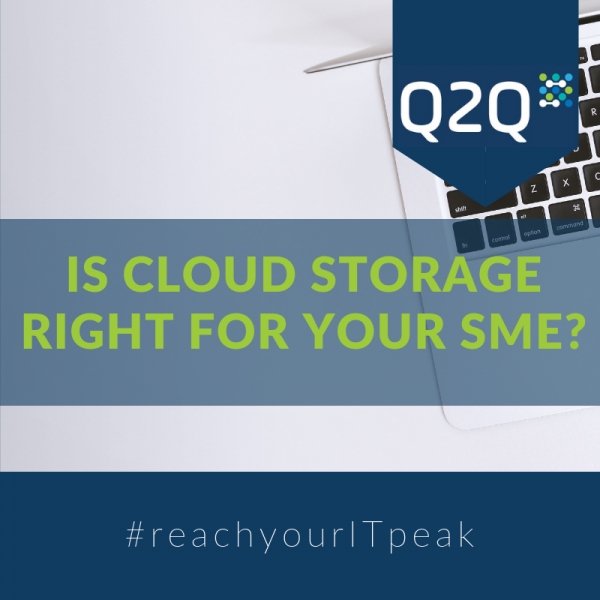When it comes to evaluating the pros and cons of cloud storage, there are many factors for businesses to consider – from safety and availability, to the firm’s uptime strategy.
But, when deciding whether cloud-based operations offer the right – secure – fit for your SME, it’s not as simple as a “yes” or “no” answer. Instead, there are many areas you should discuss with your IT provider, to ensure migrating to the cloud would be an efficient and welcomed decision for your organisation’s individual requirements.
Understanding the rationale
First and foremost, what we do here at Q2Q is sit down with our clients to really get to grips with the ‘why’. We try to establish what motivates SME owners to consider the cloud. And this is a pivotal step which shouldn’t be missed out in the early enquiry stages.
Rationale may range from thinking you need it because it sounds ‘cool,’ to wanting staff to be able to access files from anywhere – i.e. remote working – but we must to find this out.
So, if you’re pondering whether it might be right for you, it’s time to ask yourself two important questions:
– Why do you think you need cloud storage?
– What do you want to get from a cloud-based system?
Once we have those answers, we can really start to look at whether it would benefit your SME or not and offer some crucial advice – because the reality is that the cloud isn’t right for everyone.
Some things to consider…
Access and speed
Cloud storage may not always be the best option for companies who need to access and amend large documents (i.e. the editing of sizeable images). Instead, you may be better investing locally in on-site storage or in a hybrid solution such as Dropbox, which offers cloud storage with a local sync option.
Disaster recovery
One big plus-point of cloud-based systems is that they can be accessed from anywhere – given there are no restrictions in place. This is an extremely convenient benefit for companies in the event of a natural disaster – e.g. an office flood – to ensure employees remain connected.
In addition, unlike traditional on-site hardware, which would be destroyed in such an event, the cloud’s virtual nature keeps it out of harm’s way, ensuring nothing is lost forever.
Costs
It’s important to be aware of the higher fees associated with cloud-based storage – especially when compared to its local counterpart. This is because it’s usually charged on a per-user basis, unless it uses a virtual server. This is something to check with before signing up to any monthly agreements.
Additionally, cloud server rental is also an option which can be explored. However, despite offering an immediate solution, this can also be a more expensive alternative in the long run, so the cost-effectiveness needs to be weighed up.
Personal checklist
If you’re still unsure whether your SME should be adopting the cloud, this small checklist provides a handful of points to contemplate…
– Are you happy to pay a fee each month for storage?
– Does your SME have slow internet speed? (The cloud relies on reliable internet access, so if the answer is no, this would have to be looked at separately.)
– Do you have data access restrictions in place? (For instance, do you want people off-premises to be able to access the information?)
– Are you happy to invest in additional security parameters? (Remotely connecting to a network would require additional safety defences, such as the use of a Virtual Private Network).
Choosing the right provider
This part is crucial for ensuring your data is fully protected. So, some important questions to ask when looking for the right IT partner are whether they:
– Regularly back up your cloud systems – if so, how often and how much?
– Follow any security best practices? (For example, do they possess an ISO certification?)
– Carry out something called penetration testing – or ethical hacking – to assess the security of the system? They should be investigating any potential security weak points in order to prevent a ‘real’ cyber-attack from taking place.
– Store data centrally, and in the event of a fault or electronic failure is there a duplicate system where the data would be transferred, to prevent data loss?
There’s lots to mull over when it comes to the cloud, so if you have any further questions, or if you’d like to chat through your requirements with one of our dedicated techies, please give us a call on 01524 581690. Alternatively, drop us a message!



